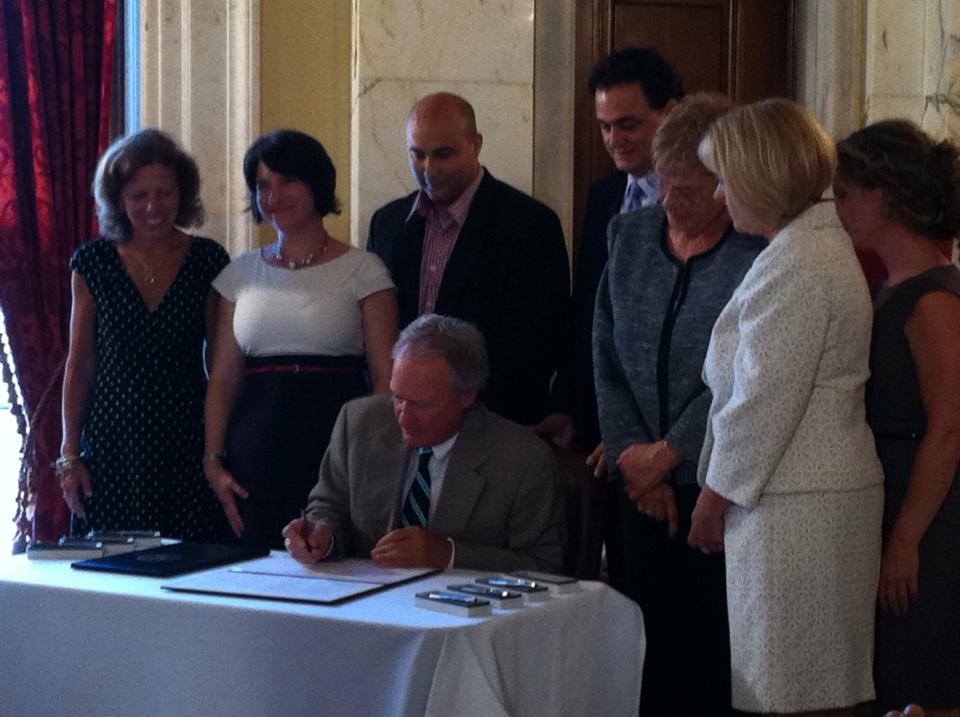Freshman Sen. Gayle Goldin (Democrat, District 3 – Providence) won national praise for Rhode Island this session when she helped shepherd through legislation that expanded the state’s Temporary Disability Insurance to cover workers who need to take time to care for a new addition to the family or a seriously ill relative. Recently, she was kind enough to sit down with RI Future for a wide-ranging interview. The following transcript has been lightly edited for written media.
RI Future: So Rhode Island’s seen a lot of female leaders stepped up and come to the fore in public life, but recently RI Public Radio’s Ian Donnis pointed out that less than a third of GA membership in the Democratic Party is women and less than a fifth in the Republican Party are women. Given that the most recent census estimate for Rhode Island is that over half our population are women, how do we rectify that imbalance and what policies can the General Assembly take?

Sen. Gayle Goldin: We rank 18th in the country in terms of the number of women in our General Assembly. Colorado is number one, and 42% of its General Assembly is female, so we have a ways to go to reach that first slot that Colorado has. I think that it’s not necessarily a role of the General Assembly itself, although I think having a woman as Senate President, and she is one of only a handful of women in the country serving that role, makes a difference. There many organizations that work on trying to increase the number of women in office. In my day job, I work at Women’s Fund of Rhode Island, and one of my tasks is overseeing the Women’s Policy Institute, which is designed to get more women engaged in public policy, generally and to really increase the voice of women in the policy arena. But there are many other organizations that work directly to recruit women into running for office and to support them in doing so. There’s been a whole host of research that identifies what various barriers are, and why women choose to run or don’t choose to run. I think certainly policy changes that are systemic changes to the way we work and live in general will increase the number of women who will also run for office.
RIF: So what would those policy changes be?
GG: Paid family leave was a big initiative of mine and a driving force behind that is because I believe having policies like that will create a more equitable society where both men and women can be engaged in the roles that they want to be engaged in. When we have universal childcare, when we invest in pre-kindergarten, when we make sure that we have eliminated the gender wage gap, women will more easily access all the roles they want to take, and that’s where we’ll hit a point where more women are holding office.
RIF: What was the most difficult part in transitioning to being a state senator from when you were a regular citizen?
GG: Well, I think that, and the literature certainly bears this out in terms of other women running for office, that fundraising is a very difficult task. I have been in the nonprofit sector almost my whole entire career and I have no problem fundraising for a nonprofit organization, but it’s a much different thing to shift and say “if you invest in me, then I’m working towards goals to change our society” and while I know people are really invested in those goals and really want to make them happen, it’s a dynamic shift go from fundraising for an organization to fundraising for your own campaign and I think that was one of the biggest challenges for me.
RIF: So was it harder to sell yourself than a cause… but you’re still selling a cause, right?
GG: [Laughs] Right. You’re still selling- yes! But there is a moment where you have to recognize that it’s okay to ask for money for yourself to help that cause and move that cause forward.
RIF: To me, it seems that the General Assembly has a set of traditions and unofficial rules that aren’t really written down that it’s just picked up over the years of operating. How do you go about learning all those? What’s the process for that?
GG: I’ve done public policy research and advocacy for many years through work and volunteering, so I’ve been up in the General Assembly in different capacities before and certainly that helps. I think that helps anybody who runs for office if you’ve already testified in hearings and seen what the system is, then you can understand it better. The staff in the Senate are absolutely incredible, and have been a wonderful resource in just understanding the plenty of written rules that you know you need to follow as well! I’ve really relied on the staff helping me figure out how to maneuver through my first year, and certainly many of the other senators have been very welcoming to the freshman class and have helped us understand how to do our jobs better.
RIF: What ways does the staff help?
GG: It can be from as simple things as in the first week of session… so sometimes the General Assembly will recognize the death of somebody or some significant event by reading a bill on the floor, and so in the first week of session, there was a condolence for somebody who had passed away and just not even realizing that it’s our job to stand up as basically seconding that as a way of showing our condolences. So just having staff behind me saying “okay, you need to stand up now” [laughs]. It’s as simple as learning those kinds of rules to really understanding what are the roles we can take within hearings, what kind of questions we- well not what kind of questions we can ask, but if my angle is to change public policy in a certain way, how can I best use my role as a state senator to do so.
Read the second part of Sam Howard’s interview with Sen. Gayle Goldin tomorrow.



